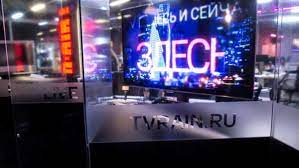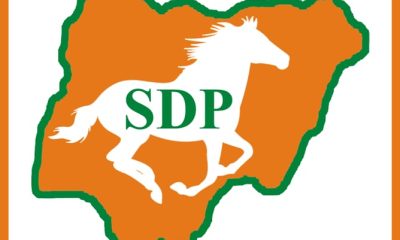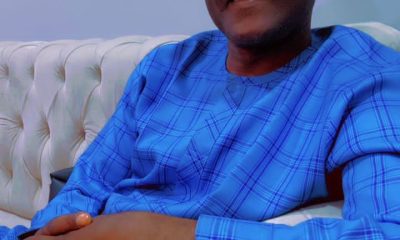Foreign News
Latvia Axes Exiled Russian Broadcaster TV Rain

Russia’s last independent television channel, TV Rain, has been shut down in Latvia after less than five months on air.
The channel, which is known as Dozhd in Russian, has been accused of showing content that supports Moscow’s invasion of Ukraine.
TV Rain has called the allegations “unfair and absurd” in a post on social media.
It has been ordered to stop broadcasting on 8 December.
TV Rain says it will obey the order but will remain on YouTube, which is where most of its audience watches its content.
However, it will no longer be able to broadcast on cable television inside Latvia, which has a large Russian speaking population.The National Electronic Media Council (NEPLP), Latvia’s media regulator, said the decision to revoke the licence was taken “in connection with threats to national security and public order”.
Earlier this month, the regulator fined the channel €10,000 (£8,613; $10,488) for displaying a map in which occupied Crimea was shown as part of Russia’s territory.
It was also censured for calling the Russian army “our army” in a piece about how to provide recruits with supplies. One of the broadcaster’s hosts, Alexei Korostelyov, was fired as a result.
The decision has been criticised by many opposition figures in Russia, who argue that TV Rain is an important source of independent information for Russian speakers about the war.
“There is Putin, who started the war. There is TV Rain, which tells the truth about Putin and about the war. Stripping TV Rain of its licence only helps Putin,” said Kira Yarmysh, press-secretary to jailed opposition leader Alexei Navalny.
The charity Reporters Without Borders called the move a “serious blow to freedom of information”.
The channel, which has long been critical of Vladimir Putin and the Russian government, was blocked in Russia in early March, just days after Moscow invaded Ukraine.
Many employees then fled Russia, and later started work on rebuilding Dozhd abroad. It is one of several independent media outlets to have moved its operations out of Russia or suspended them since the invasion.
The State Security Service (VDD) has been investigating the incident and said it has repeatedly warned about the “various risks emanating from Russia’s so-called independent media relocating their activity to Latvia”.
The VDD said these risks include the possible connections of media representatives to Russian intelligence and security services, as well as the danger posed if Moscow seeks to target Latvia as part of measures to influence public opinion online and elsewhere.
Commenting on its decision to revoke TV Rain’s broadcasting licence, NEPLP added that it “was convinced that the management of TV Rain did not understand the nature and gravity of each individual infringement, nor of any set of infringements”.
Meanwhile, Kremlin spokesperson Dmitry Peskov told reporters that “some always think that there is a place better than home, that there is always more freedom than at home. This is one of the clearest examples that shows that these are the wrong illusions”.
Foreign News
Australian Researchers Launch Open-source, Affordable DNA Measurement Device

Australian researchers have created an affordable, open-source device to measure DNA levels using parts made with a standard 3D printer.
The Do-It-Yourself Nucleic Acid Fluorometer (DIYNAFLUOR) offers an affordable alternative to expensive commercial DNA fluorometers, often out of reach for many researchers.
This is according to a statement released on Wednesday by Australia’s University of Queensland (UQ), which led the research.
Fluorometers, vital for DNA sequencing, which itself is essential for disease detection, therapeutic innovation, and species identification, can now be easily built at home.
Thanks to the simple, accessible device developed by UQ’s Australian Institute for Bioengineering and Nanotechnology (AIBN), the statement said.
The device can be built in under a day for around 60 Australian dollars (about 39 dollars) using off-the-shelf electronics and 3D-printed parts.
It’s with free instructions online and no need for advanced skills or specialised tools, said the designer of the device, Will Anderson, at the AIBN.
Once built, the device quantifies DNA by using a light beam to produce a fluorescent response from the dyed DNA present in the sample.
It would then report the DNA concentration to a connected computer, Anderson said.
“This is crucial information that can tell you whether you can proceed with more expensive tests and sequencing,” he added.
Laboratory tests confirmed the device matches the accuracy and sensitivity of costly commercial models, offering an affordable, open-source solution for researchers in resource-limited, remote, or educational settings, said the study.
Foreign News
Trump Imposes 25% Tariff on Indian Goods, Criticizes Ties with Russia

U.S. President Donald Trump said he is imposing a 25 per cent tariff on goods from India starting on Friday.
Writing on his Truth Social platform, Trump sharply criticises New Delhi for its military and energy ties with Russia.
He described India as a “friend” but accused the country of maintaining unfair trade practices that disadvantage U.
S. businesses.India has “strenuous and obnoxious” trade barriers that keep its markets closed to companies, he wrote, adding that its tariffs are “far too high.
”Trump also took aim at India’s relationship with Russia, saying: “They have always bought a vast majority of their military equipment from Russia, and are Russia’s largest buyer of ENERGY, along with China.
In addition to the new tariff, Trump said India would face a financial “penalty” for its purchases from Russia, though he did not provide further details.
Foreign News
Zelensky Announces New Draft Law on Anti-corruption Bodies after Protests

Ukrainian President Volodymyr Zelensky said he has approved the text of a draft law guaranteeing the freedom of two anti-corruption bodies in Ukraine – days after nationwide protests broke out over changes curbing their independence.
Kyiv’s Western partners had also expressed serious concerns over the legislation.
On Thursday, Zelensky seemed to backtrack, saying the new bill was intended to safeguard the independence of Ukraine’s National Anti-Corruption Bureau (Nabu) and Specialised Anti-Corruption Prosecutor’s Office (Sap), and to protect them from Russian influence.
He said the text of the bill was “balanced”, but did not provide any details.
The law passed earlier this week brought Nabu and Sap under the control of the prosecutor general, who is appointed by the president.
At the time Zelensky justified his decision to curtail the bodies’ powers by citing Russian influence. The day before, Ukraine’s security services had carried out searches and arrests targeting alleged Russian spies at the agency.
The passing of the legislation instantly sparked the largest protests since the start of Russia’s full-scale invasion in February 2022 in several cities across Ukraine, with many worrying the law would severely undermine the Nabu and Sap’s authority and effectiveness.
Thousands of people gathered in streets and squares across Ukraine, holding placards calling for the legislation to be vetoed.
Several commentators accused Zelensky of democratic backsliding. Their concerns were further exacerbated when Ukraine’s Western partners signalled their displeasure with the bill.
Ukraine has official EU candidate status and a spokesman for European Commission chief Ursula von der Leyen previously warned Kyiv that the rule of law and the fight against corruption were “core elements” of membership to the bloc.
On Thursday, the Commission said it “welcomed” the Ukrainian government’s decision to take action against the bill.
“We are working [with the Ukrainian government] to make sure that our concerns… are indeed taken into account,” the spokesman said.
Nabu and Sap were created in 2014-15 as one of the requirements set by the European Commission and International Monetary Fund to move towards a relaxation of visa restrictions between Ukraine and the EU.
Writing on Facebook, opposition MP Oleksiy Goncharenko noted Zelensky said that “the independence of anti-corruption institutions must be guaranteed.”
“First we take it away, and then we say that it must be guaranteed. So why was all this necessary?”
In his message on social media on Thursday, Zelensky did not acknowledge the protests or the backlash but said it was “important that we respect the position of all Ukrainians and are grateful to everyone who stands with Ukraine.”




















